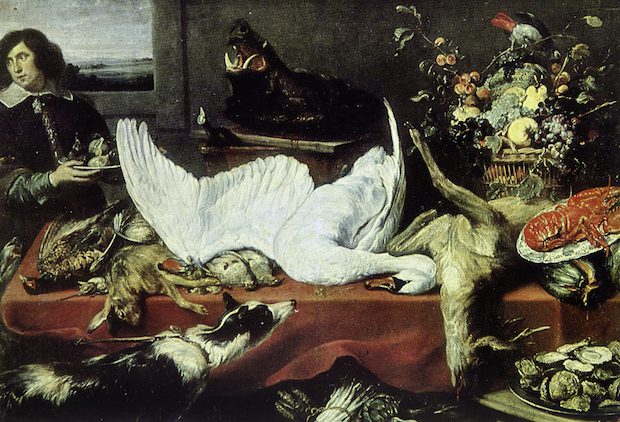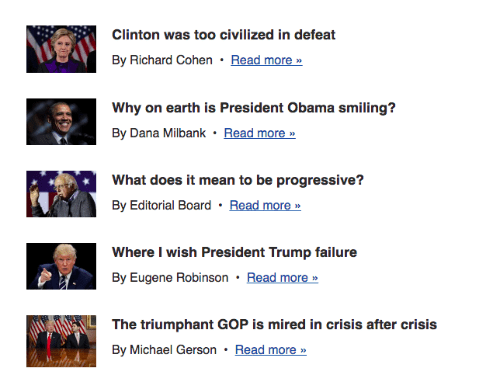Dead Swans And The ‘Grand Decadence’

Here, sent by a reader and taken from the Washington Post website, is a snapshot of the mind of official Washington:

As you know, I did not vote for Trump, but this past week, when confronted by the collective gran mal seizure of the left, Oscar Wilde’s cruel line about Dickens’ The Old Curiosity Shop came several times to mind: “One must have a heart of stone to read the death of Little Nell without laughing.” I mean, honestly, look at what the University of Michigan Law School — the Law School! — had planned to comfort its traumatized students:

And yet, now that we are almost a week into the Trumpening, the derisive laughter, however much deserved, is starting to become hollow. I don’t know that Stephen K. Bannon is an anti-Semite, but it is clear that he is not a good man, and having a man of his character and temperament sitting at the right hand of the President of the United States is not a sign of the Republic’s vigor. One senses that we will soon be longing for the golden years of Haldeman, Ehrlichman, and Colson.
The other night, the Harvard Law professor Mary Ann Glendon gave a beautiful lecture at Notre Dame about the poet Wallace Stevens and the Catholic imagination. (You can watch it here.) Last night at bedtime, thinking about what Prof. Glendon had to say, I picked up my copy of The Collected Poems of Wallace Stevens, and read around. I happened upon his poem “Academic Discourse At Havana”. It is a difficult poem (Stevens is a difficult poet), and I can’t pretend to understand the whole thing. But certain lines resonated with me in this present political and cultural moment. This second stanza:
Life is an old casino in a park.
The bills of the swans are flat upon the ground.
A most desolate wind has chilled Rouge-Fatima
And a grand decadence settles down like cold.
Stevens once said that Fatima was the most beautiful woman in the world, and that he used the word “rouge” here to “touch her up.” The image suggests that even our artificial efforts to fill faded beauty with life cannot withstand the desolating chill. The overall image — of a dead casino with dead swans — is one of an exhausted life. A casino in a park is a city in a wood, once a place where life was concentrated, and fate determined the joy of the people within it. But now all that has passed. Stevens speaks of leaves filling the fountains at the casino, an image that brought to mind a Santayana metaphor cited by Mary Ann Glendon in her lecture: “a harvest of leaves.” Santayana used it to describe the false sense of intellectual fertility in mid-19th century New England. Here’s the Santayana quote, as presented by Glendon:
About the middle of the nineteenth century, in the quiet sunshine of provincial prosperity, New England had an Indian summer of the mind; and an agreeable reflective literature showed how brilliant that russet and yellow season could be. There were poets, historians, orators, preachers…they were universal humanists. But it was all a harvest of leaves; these worthies had an expurgated and barren conception of life; theirs was the purity of sweet old age.
Now, “Academic Discourse At Havana” is not really a poem about decadence, but rather one about the trickiness of imposing meaning on matter, and the difficulty of perceiving reality. Remember that Stevens was one of the great Modernists, and at this stage of his life, was an atheist. In the poem’s next stanza, Stevens knocks the illusions of people who thought the now-dead swans and all they represented would live forever:
The toil
Of thought evoked a peace eccentric to
The eye and tinkling to the ear. Gruff drums
Could beat, yet not alarm the populace.
The indolent progressions of the swans
Made earth come right; a peanut parody
For peanut people.
What he’s saying here is that people chose to believe the illusions of order around them, and worked hard (“The toil/Of thought”) to believe that what they had — the casino, the park, the swans — would last forever. The peace is “eccentric to/The eye” because it contradicts what the eye sees. So, when the “gruff drums” of approaching apocalypse are heard in the distance, no one gets alarmed. They just looked upon the swans and thought about how everything was really as it should be. Stevens’s scornful line (“a peanut parody/For peanut people”) suggests that their unserious gaze treats the world as a circus, and reduces themselves to circusgoers.
But the next stanza tears into idealists. If the Swan People are compromised by the illusion that there was a Golden Age that would last forever, then those who believe that perfection is ever achievable are also deluded. “This urgent, competent, serener myth/Passed like a circus,” he writes, indicating that a more philosophical and reflective pursuit of perfection is no less circus-like.
And then Stevens takes down the self-styled realists who “ordained/Imagination as the fateful sin”. The realist who believes that art, religion, and poetry are nothing but the means by which we feed false gods is also subject to his own illusions. He thinks he is telling himself the hard truth about the meaninglessness of the world, but in the end, when faced with the brute fact that all things decay and die, we find that we need these things because they comfort us with a sense of transcendence. This too, Stevens suggests, is a construal. The final line — “Life is an old casino in a wood” — tells us that none of us can live without analogy and metaphor to impose meaning on our experiences.
The fourth and final stanza reveals Stevens’s view: that the poet mediates between us and the phenomenal world. He does not tell us what to believe; rather, he opens up new ways of seeing the world after the old illusions have lost their power to give sight. This is a poem about wonder in the face of dazzling reality, and the redemptive power of those who can open our weary eyes to it. In that sense, “Academic Discourse In Havana,” though written by an atheist, is a deeply religious poem. Stevens concludes by saying that the words of a poet might lie to us, leading us to believe that an apocalypse is upon us when in fact that is not the case. Maybe an old, boarded-up casino in Havana is not a metaphor of our own decadence, but is in truth nothing more than a failed business. Or, says Stevens, a poet’s words might reveal to us that an apocalypse is, in fact, upon us, and may in that case be a kind of protest against our own passing:
And the old casino likewise may define
An infinite incantation of our selves
In the grand decadence of the perished swans.
In other words, by naming the old casino as a symbol of the great forces that threaten to annihilate us, we may find that we have power over them. In this case, art and poetry (and, I would say, religion) give us the power to endure the unendurable. There’s a line in the new movie Doctor Strange in which one of the mystic warriors instructing Stephen Strange in sorcery tells him the function of “relics” in this world. When the power of certain magic is too great for them to bear, they direct it into an object to hold. This is what Wallace Stevens says the poet does with words and metaphor.
Reading this poem brought to my mind the apophatic prayer method of the Orthodox mystics, who instruct those learning the Jesus Prayer to push all images out of their minds as they pray, the better to still the mind and prepare it to encounter the living God without analogy. It also brought to mind — as Mary Ann Glendon says in her lecture — the words of Joseph Ratzinger, who said that art and the saints (that is, beauty and goodness) are better arguments for the truth of Christianity than syllogisms. When rational discourse is exhausted, instances of beauty and goodness can provide us windows allowing us to see into the Truth of things, and to carry on. Not all that is true and real can be captured in mere words and syllogisms.
So. You are thinking: what on earth does all this have to do with Trump? Let me explain.
The accession of men like Donald Trump and Steve Bannon to the heights of political power are an unmistakable sign of decadence. It’s not that Trump is the first bad man to hold that office. For example, we did not know how decadent John F. Kennedy truly was, but had we known, he never would have been elected. (The Camelot mythology obscures, not enlightens.) The point about Trump is that we all know who he is and what he is, and yet we still chose him. Nobody can be shocked that he has elevated Steve Bannon in his White House: that’s who Trump is. He told us this about himself. He hid nothing.
And yet, when I read the collective gasp of the Establishment, in Washington and elsewhere, I realize that they have little idea of their own decadence, and how it led to Trump. Do you people really not see your own fault here? Do you not grasp how you collaborated in this ruin? The Washington consensus led us into a disastrous war for the second time in only half a century. The Washington consensus, in collaboration with Wall Street, opened the gates to a financial catastrophe that devastated countless ordinary Americans. The inability or unwillingness of Washington to police effectively our nation’s borders contributed to the insecurity of ordinary people, and the Washington consensus on free trade left millions and millions of workers unemployed or underemployed, even as it enriched the bank accounts of wealthier Americans.
Meanwhile, the Entertainment-Industrial Complex has been pumping out moral sludge for decades. The Academy has failed to transmit wisdom and culture, and respect for our civilization’s ideals, and has driven out dissent (kudos to conservative students at the University of Michigan for denouncing the university’s president for his post-election asininity; “Mr. Trump won because people like me are sick and tired of people and institutions telling us the ‘correct’ way to think and view the world”).
And the churches? Please. It’s Moralistic Therapeutic Deism all the way down. We are now at a point in which marriage and the family are dissolving, and our elites call that virtue. There is nothing that Donald Trump or any president can do to stop it.
Philip Rieff wrote, in the mid-Sixties:
The death of a culture begins when its normative institutions fail to communicate ideals in ways that remain inwardly compelling, first of all to the cultural elites themselves. Many spokesmen for our established normative institutions are aware of their failure and yet remain powerless to generate in themselves the necessary unwitting part of their culture that merits the name of faith. “Is not the very fact that so wretchedly little binding address is heard in the church,” asked Karl Barth, rhetorically, in 1939, “accountable for a goodly share of her misery—is it not perhaps the misery?” The misery of this culture is acutely stated by the special misery of its normative institutions. Our more general misery is that, having broken with those institutionalized credibilities from which its moral energy derived, new credibilities are not yet operationally effective and, perhaps, cannot become so in a culture constantly probing its own unwitting part.
Name one established normative institution in American culture that conveys ideals that remain inwardly compelling. Can’t do it, can you? Hillary Clinton was the symbol of the decadent old order, the one that fewer and fewer people believe in. Can you imagine how far things have had to decay for the very embodiment of the American political establishment to lose a presidential election to Donald J. Trump? True, Trump represents a bad direction for America, an order that may be new, but is rotten through and through (some they think of him as “a kind of solution”). But then again, he is not so different from Hillary Clinton. They were both running to be the floor boss at an old casino.
This is a time and this is a place in which we do not need politicians and pundits, but rather poets, priests, and prophets. We need those who can read the signs of the times, and reveal to us the phoenixes rising from the corpses of swans and the source of life and renewal beyond the leaf-choked fountains.